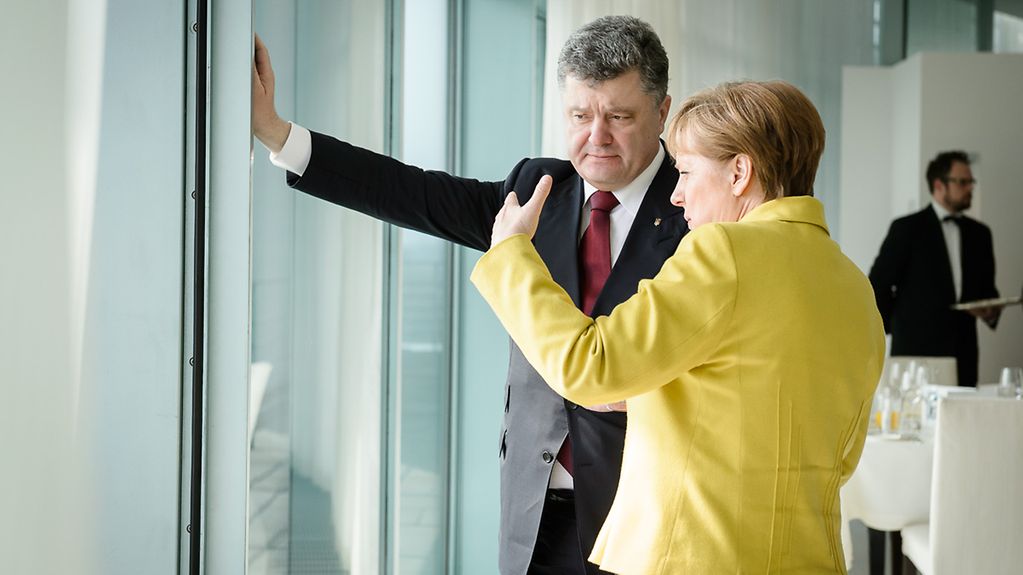Petro Poroshenko in Berlin
Chancellor Angela Merkel has pledged Ukraine continued support. "The Minsk package is the way we see to achieve a peaceful solution," she said after her meeting with the Ukrainian President Petro Poroshenko. She would only consider imposing new sanctions on Russia "if necessary" she said.
4 min reading time

The implementation of the Minsk agreements was the main focus of the Chancellor's meeting with President Poroshenko
Photo: Bundesregierung/Steins
Chancellor Angela Merkel expressed her "great respect" for the efforts made by Ukraine’s leadership to achieve a peaceful future for Ukraine. After an intensive exchange of views at the Federal Chancellery, she assured Ukraine’s President Petro Poroshenko of further support.
Anniversary of the annexation of Crimea
On the first anniversary of the illegal annexation of Crimea by Russia the Chancellor said very clearly, "I would once again like to make it plain that we will not forget this action. We will not forget because it has called into question the European peace order."
The Chancellor then added, "It is nevertheless important, indeed it is important precisely because of what has happened in Crimea, to continue to work for a peaceful solution. And it is important that we do not let up in our efforts before Ukraine’s full sovereignty and territorial integrity is restored."
Elements in resolving the conflict
Efforts to identify a solution naturally include Crimea, but day to day work focuses in particular on the areas around Luhansk and Donetsk. Germany is pursuing three fundamental elements: firstly it is supporting Ukraine; secondly, it is pushing for a peaceful and diplomatic solution to the conflict; thirdly it is willing to introduce new sanctions on Russia if necessary.
These are not an end in themselves, however, stressed the Chancellor. "We do not want these sanctions, but if they are unavoidable them they must be implemented". She is less interested in discussing new sanctions, she said, than in discussing the full implementation of the Minsk agreements.
In light of new developments, however, the EU will decided if necessary on new steps to take, explained Angela Merkel. In this context she looked at the causes of the conflict once more. It was Russia, she pointed out, which violated the territorial integrity of sovereign Ukraine in blatant contradiction to the 1994 Budapest Memorandum.
On Thursday and Friday the European Council will meet in Brussels. The situation in Ukraine is one point on the agenda.
Implementation of Minsk agreements still difficult
Nevertheless, the idea now is to try everything to achieve compliance with the Minsk agreements. "It is proving complicated to implement the agreements. The ceasefire is still incomplete," said Angela Merkel.
It is now important to ensure that the withdrawal of heavy weapons is transparent. "There are still major gaps on the part of the separatists, in terms of specification, verification, and free access for OSCE observers to the relevant regions". The Chancellor thanked the OSCE staff in Ukraine. "They are working under difficult conditions."
Alongside the ceasefire and the withdrawal of heavy weapons it is also important that humanitarian aid can be launched at last. "Unfortunately it has still not been possible for the International Red Cross to gain adequate access to the areas around Donetsk and Luhansk. Things must improve here."
German support for Ukraine
Over and above this, Germany is supporting the work of the Trilateral Contact Group, which consists of representatives of Ukraine, Russia and the separatists and is facilitated by the OSCE. The exchange of prisoners too must make progress. "Once the withdrawal of heavy weapons has been certified, once the ceasefire is fully observed and prisoners released, we will of course have more opportunities to push ahead with the political process," explained the Chancellor.
The Chancellor explained that she and President Poroshenko had discussed both the forthcoming Status Act for the regions of Ukraine and the economic situation. In particular, it is important that the IMF programme is "properly implemented". "Germany is willing to help here too."
There is no alternative to Minsk agreements
Angela Merkel also pointed to the huge efforts already made by Ukraine, in laying the foundations for the Minsk agreements in September 2014 and approving the package of measures to implement these in February 2015. The Minsk package is "the way to achieve a peaceful solution – and that is why we continue to support this path forward," stressed the Chancellor.
"We will do everything we can – and I know that this is also true of France – to give this peaceful option a chance, although we still face a very uphill task." The latter can be expected given the experience gained since 12 February, said Angela Merkel.
President Petro Poroshenko has been in Germany since Sunday. He first visited Dresden, where he spoke with Ukrainian soldiers injured in the fighting. On Monday morning he was welcomed by President Joachim Gauck. In the afternoon he will meet with Bundestag President Norbert Lammert and Federal Defence Minister Ursula von der Leyen.